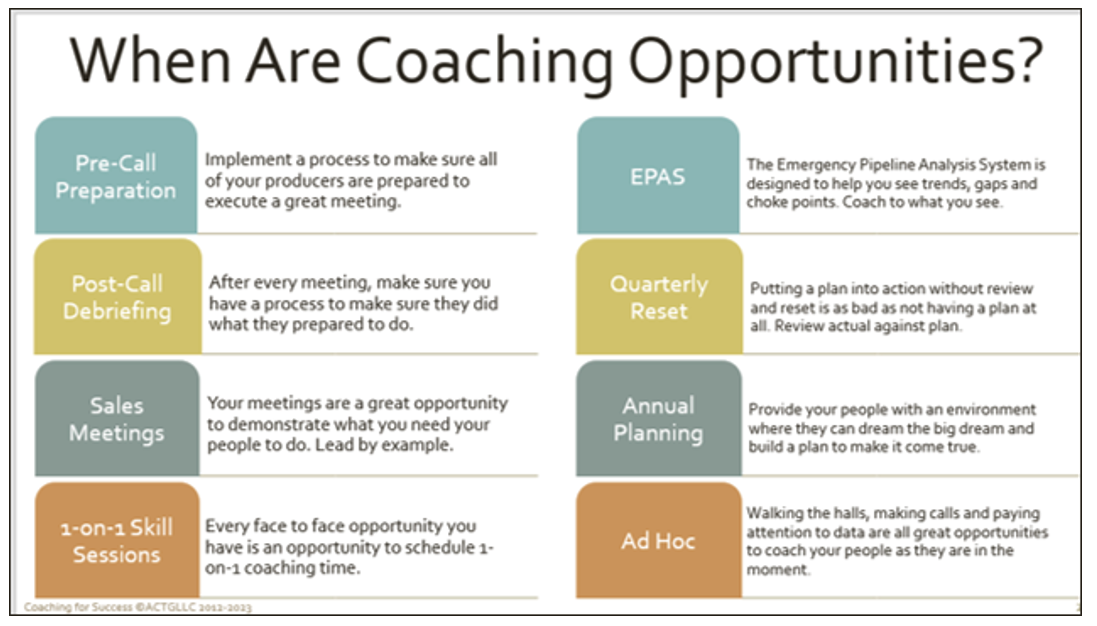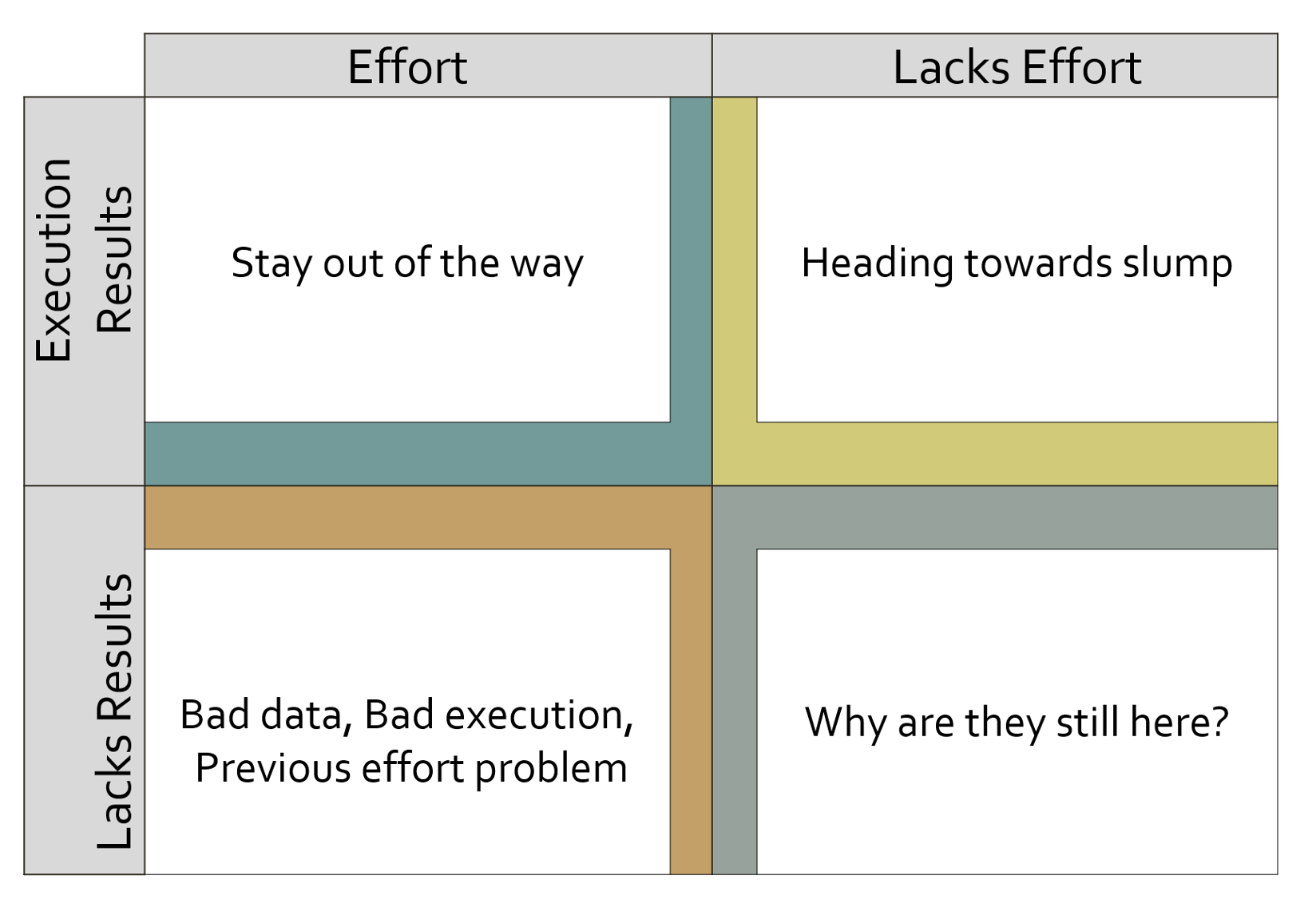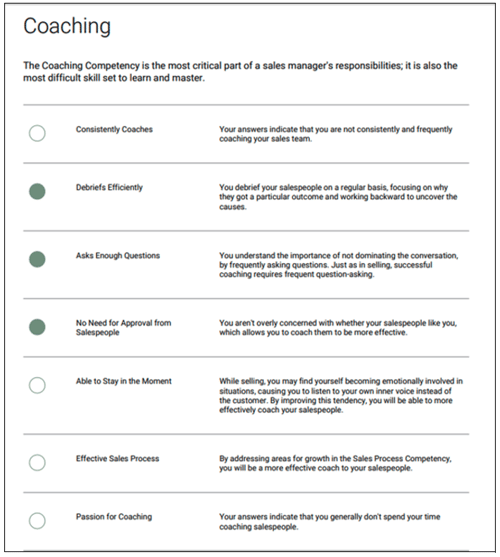If you are in charge of managing a sales team to reach sales goals, you must ask yourself this critical question; “Am I an effective sales coach?”
Much like a good sports coach, a good sales coach gets involved in all aspects of the job, including both the selling skills and the mental state of his or her salespeople. Certainly, the coach trains, develops and mentors their salespeople to become better at the role of selling. But the most important role of the sales coach is to help their salespeople achieve their personal goals. To achieve their goals, salespeople need both skill and knowledge – and someone to coach them to excellence. How good are you at coaching your salespeople to be their very best?
Here are 7 sales coaching best practices to master to improve your coaching:
#1 Sales Coaching Best Practice: Debrief Effectively
An effective and proactive coach is in a constant state of debriefing their people. Whether their salespeople are returning from an initial appointment with a new client, presenting a solution to a new client, or renewing a current relationship, a coach must constantly have real time intel as to how the salesperson is performing. One sales coaching best practice is to have regularly scheduled debriefing times in their ideal week calendar. During the sessions, the effective sales coach will be armed with great questions to find out what happened, how things happened, and why they happened. Questions about the prospect’s compelling reason to take action, their willingness to invest, their ability to make a change from a current provider and the decision-making process are the questions that must be asked in addition to the technical aspect of the sale relative to product and service offerings. Based on the answers, the sales coach must begin to develop insight as to where the choke points are in a salesperson’s approach in order to coach them for skill improvement.
#2 Sales Coaching Best Practice: Effective on Joint Calls
While on a joint call, there are roles for everyone. That is why doing pre-call meetings, before the meeting are so important. The sales coach has to make sure that his salesperson is prepared to conduct the perfect sales meeting and the coach’s role is to be defined as supportive in nature, not the main character. This means that when the coach is on the call and the sales professional is making mistakes, they must let them. and oddly, this is a sales coaching best practice. An effective coach will not rescue them as they understand that is how they will learn. Now a good coach will not let them blow the sale of a life time. But they will not bail them out and rescue them when they forget to ask a critical question. Once the call is over, the sales coach conducts the post call debrief with the sales person. The effective coach will first ask their sales person to tell them how they thought it went. The coach can then compare comments made to their own observations and from that, share their insights as to how well the sales professional performed.
#3 Sales Coaching Best Practice: Ask Quality Questions
Having a conversation with someone is much more pleasant then going through an interrogation. This is important for the effective coach to remember if they are focused on asking questions. After two or so questions, the sales person is going to feel like the coach is picking on them rather than coaching them to improve. Let’s say that a sales person has a tendency to miss finding out about the competition. The coach could ask them: “Did you find out about the competition?” or they could ask “When you asked them how they were going to undo the current relationship, how did they respond?” Which question is going to give better insight as to how the salesperson is executing on their sales system? Open-ended questions tend to make coaching sessions more conversational which why they are a sales coaching best practice. The open-ended questions will help the sales person identify the gaps between what is expected and what is getting done.
#4 Sales Coaching Best Practice: Demonstrates an Effective Selling System
Great sales coaches really know their sales process and selling system. They know it so well that they own the content and process. The sales leader exhibits the sales skills expected of the sales team in everything they do. They ask open-ended questions. They help people discover the issues. They make sure that the other person wants to fix the problem. They check for the ability to invest time to fix the problem, and finally, they get commitment. An effective sales coach must demonstrate what they expect. This mastery of the system is what allows the coach to identify incorrect behavior when they observe their salespeople in a prospecting situation or role-playing session with peers. If the sales coach does not know, then you can’t possibly expect their salespeople to know.
#5 Sales Coaching Best Practice: Effective at Getting Commitments
Gaining commitment is a sales coaching best practice for the on-going development and improvement in a sales team. Even with top producers, a sales coach must gain their commitment to execute at high levels and discuss with them their personal goals, and their commitment to attain those goals, through committing to the required sales activities. Sales people commit to what is important to them. It may be important to salespeople that shareholder value increases, but as a sales coach, don’t count on that. What motivates most salespeople is their own set of personal objectives, goals and ambitions. The coach’s job is to help them discover the goals they are committed to and then help them discover their ‘current state’. And when there is a gap, (such as their current sales pipeline and closing ratio will not help them buy that new house they were hoping for), then an effective coach helps them discover the ‘pain’ of the eventual outcome of their current state and the change that must take place to achieve their goals.
#6 Sales Coaching Best Practice: Consistently Coach Skills & Behaviors
Most sales coaches do not understand the difference between performance management (discussing the sales activities, i.e.; the numbers) and coaching (how the activities are being executed). Coaching focuses on how someone did what they did. Every sales leader’s calendar should have consistent scheduled times for coaching their people. Effective coaching focuses on skills and behaviors, the how of what people do. Sales coaching should include the following: asking questions, drilling down on those answers, getting commitments, helping salespeople overcome objections and helping salespeople with their own performance issues. Coaching is not about how to structure a deal. That is teaching. Coaching is rolling up the sleeves and getting into the art and science of the sale, rather than the mechanics of the product and service design of the offering.
#7 Sales Coaching Best Practice: Effectively On-board New Hires
On-boarding a new salesperson is critical as it will determine both the immediate and long-term success of new hires. Here are three sales coaching best practice on-boarding steps:
- The sales coach must communicate their vision, objectives and expectations to the extent that if the salesperson was asked, they could repeat without hesitation and in great detail.
- The sales coach must schedule weekly coaching sessions with their new hires to help them create and execute on their plan and learn, implement and inspect their effective selling process.
- An effective coach can use their huddle data, pipeline growth and notes from pre- and post-call debriefing sessions to see if their new hire is exceeding activity and behavior expectations. From that critical early data, they can begin to identify and teach and coach to the salesperson’s choke points.
Our coaching tip for you, the coach, is to select at least 3 of these sales coaching best practices and focus on them, improve your own skills and by doing so, you will help your salespeople improve their levels of performance. Let’s go, Coach!





